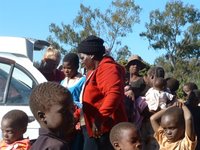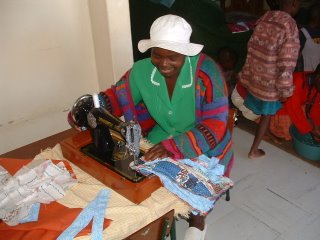For weeks, I had sought an opportunity to accompany Janine Roberts on one of her visits to farms near Old Mutare. At last, within a day of my leaving, that intention came true.
Janine directs a small, highly effective program called Hope of Zimbabwe from her home at Fairfield Children’s Home. Her mission is a simple one: reach out to people in need of care in the rural bush near Old Mutare. There is a medical component, caring for people suffering and dying of HIV/AIDS. There is also a childcare component, providing clothing and school fees to terribly needy children, many of them orphans. Janine came to Old Mutare two years ago to expand an informal effort by MaiChimba, one of the real heroes
whom I was thrilled to meet and know. MaiChimba continues to work with Janine, and at present, an American volunteer, Melissa Maher, a student at Asbury Seminary, is working with Janine and MaiChimba as well.
On Thursday at 1:00 p.m., we began a short trip by car to Miekles’ Farm, perhaps five kilometers from Fairfield Children’s Home, much of the trip on narrow, bumpy tracks through fields. Our destination was a cluster of thatch-roofed, clay-sided huts, 50 or more, scattered among fields but connected by well-worn paths. We began a tre k among those houses, stopping at most of them to greet people. Children were everywhere. As we moved about, I quickly realized that although a mere stone’s throw from Old Mutare, the level of abject poverty I was seeing was unlike anything I had seen during my 13-week stay. I was amazed and shocked by what I saw—and puzzled that I had heard nothing about such intensity of need so close by.
k among those houses, stopping at most of them to greet people. Children were everywhere. As we moved about, I quickly realized that although a mere stone’s throw from Old Mutare, the level of abject poverty I was seeing was unlike anything I had seen during my 13-week stay. I was amazed and shocked by what I saw—and puzzled that I had heard nothing about such intensity of need so close by.
Then I reminded myself, I had heard but had no experience by which to comprehend what I was hearing. MaiZvingo, the third-grade teacher in whose classroom I taught, had told me about the sorry living conditions of many of her students, and the headmaster, Shadreck Mufute, had shown me homes as we drove along roads far more distant, from which Primary School students come, walking many kilometers each way to school. Still, until I walked those pathways of Miekles’ Farm, I had no idea of the reality of their words. Now I knew, and it was distressing. How in the world can children learn when they must live with such utter deprivation?
As we walked about, we came to the home of a grandmother raising her grandchildren (one of many in that hodgepodge of huts), both of their parents, her children, dead from AIDS. That grandmother, obviously quite old, leaned on a cane as she walked. English was not her forte, and she struggled to tell us what was on her mind. Soon, we figured out that she wanted us to meet her granddaughter and see her report card. She called Cleopatra from inside their hut, and she soon came out, clutching a familiar booklet with the logo of Hartzell Primary School on its cover, the report card she had received that morning when school closed.
Shyly, Cleopatra handed the booklet to Janine, then to me. I turned to the last completed page (report cards at Hartzell Primary follow the child through every grade, marks added at the end of each three-month term). It was obvious that she had done very well; her teacher’s comments were highly complimentary. I looked at the top of the page where her class standing was listed—number ONE in her class! Next to it, her standing in the entire third-grade—number TWO of at least 100 students. My eyes and mind turned to the pitiful surroundings in which I stood, in which Cleopatra was growing up. I looked at that little girl, now not in a neat school uniform but in tattered clothes she wore at home. I realized I was looking at a unique child for whom learning was a joy despite the misery of her environment. I saw a halo around that little girl’s head, although you will not spot it in her picture.
handed the booklet to Janine, then to me. I turned to the last completed page (report cards at Hartzell Primary follow the child through every grade, marks added at the end of each three-month term). It was obvious that she had done very well; her teacher’s comments were highly complimentary. I looked at the top of the page where her class standing was listed—number ONE in her class! Next to it, her standing in the entire third-grade—number TWO of at least 100 students. My eyes and mind turned to the pitiful surroundings in which I stood, in which Cleopatra was growing up. I looked at that little girl, now not in a neat school uniform but in tattered clothes she wore at home. I realized I was looking at a unique child for whom learning was a joy despite the misery of her environment. I saw a halo around that little girl’s head, although you will not spot it in her picture.
Of course, I realized that for everyone like Cleopatra, there were dozens who were not doing well, held back by the deprivation of daily life, the children MaiZvingo and Mr. Mufute care so much ab out. At the end of our trek among the houses, we returned to the car where Janine, MaiChimba and Melissa began to distribute clothing to a long line of orphans. Many more children, and a few grannies and other adults, stood by, watching as each child received two garments and a pair of shoes. Were they thinking that it was lucky to be an orphan? Every one of them could have used new garments, and all were shoeless, but there were not enough clothes for all. I was watching a prototype of what regularly happens in rural Africa, needs eclipsing remedies by far. Drops in a bucket? Or mustard seeds? The answer eludes me—but I will side with mustard seeds!
out. At the end of our trek among the houses, we returned to the car where Janine, MaiChimba and Melissa began to distribute clothing to a long line of orphans. Many more children, and a few grannies and other adults, stood by, watching as each child received two garments and a pair of shoes. Were they thinking that it was lucky to be an orphan? Every one of them could have used new garments, and all were shoeless, but there were not enough clothes for all. I was watching a prototype of what regularly happens in rural Africa, needs eclipsing remedies by far. Drops in a bucket? Or mustard seeds? The answer eludes me—but I will side with mustard seeds!






 k among those houses, stopping at most of them to greet people. Children were everywhere. As we moved about, I quickly realized that although a mere stone’s throw from Old Mutare, the level of abject poverty I was seeing was unlike anything I had seen during my 13-week stay. I was amazed and shocked by what I saw—and puzzled that I had heard nothing about such intensity of need so close by.
k among those houses, stopping at most of them to greet people. Children were everywhere. As we moved about, I quickly realized that although a mere stone’s throw from Old Mutare, the level of abject poverty I was seeing was unlike anything I had seen during my 13-week stay. I was amazed and shocked by what I saw—and puzzled that I had heard nothing about such intensity of need so close by.
 handed the booklet to Janine, then to me. I turned to the last completed page (report cards at Hartzell Primary follow the child through every grade, marks added at the end of each three-month term). It was obvious that she had done very well; her teacher’s comments were highly complimentary. I looked at the top of the page where her class standing was listed—number ONE in her class! Next to it, her standing in the entire third-grade—number TWO of at least 100 students. My eyes and mind turned to the pitiful surroundings in which I stood, in which Cleopatra was growing up. I looked at that little girl, now not in a neat school uniform but in tattered clothes she wore at home. I realized I was looking at a unique child for whom learning was a joy despite the misery of her environment. I saw a halo around that little girl’s head, although you will not spot it in her picture.
handed the booklet to Janine, then to me. I turned to the last completed page (report cards at Hartzell Primary follow the child through every grade, marks added at the end of each three-month term). It was obvious that she had done very well; her teacher’s comments were highly complimentary. I looked at the top of the page where her class standing was listed—number ONE in her class! Next to it, her standing in the entire third-grade—number TWO of at least 100 students. My eyes and mind turned to the pitiful surroundings in which I stood, in which Cleopatra was growing up. I looked at that little girl, now not in a neat school uniform but in tattered clothes she wore at home. I realized I was looking at a unique child for whom learning was a joy despite the misery of her environment. I saw a halo around that little girl’s head, although you will not spot it in her picture.  out. At the end of our trek among the houses, we returned to the car where Janine, MaiChimba and Melissa began to distribute clothing to a long line of orphans. Many more children, and a few grannies and other adults, stood by, watching as each child received two garments and a pair of shoes. Were they thinking that it was lucky to be an orphan? Every one of them could have used new garments, and all were shoeless, but there were not enough clothes for all. I was watching a prototype of what regularly happens in rural
out. At the end of our trek among the houses, we returned to the car where Janine, MaiChimba and Melissa began to distribute clothing to a long line of orphans. Many more children, and a few grannies and other adults, stood by, watching as each child received two garments and a pair of shoes. Were they thinking that it was lucky to be an orphan? Every one of them could have used new garments, and all were shoeless, but there were not enough clothes for all. I was watching a prototype of what regularly happens in rural